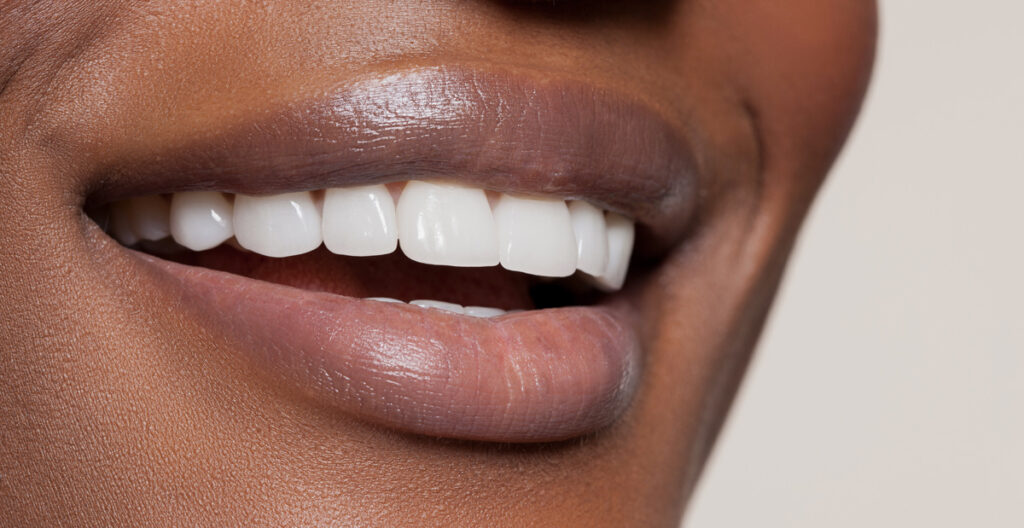A confident smile can make a huge difference in both personal and professional life, yet many people feel self-conscious about their teeth due to cosmetic concerns, minor imperfections, or damage.
Dental veneers have become a popular solution in cosmetic dentistry for transforming the appearance of your teeth. But what are veneers, and how could they improve your smile?
Here’s everything you need to know about veneers, including the types available, how the procedure works, the benefits, considerations, and payment options in the UK.
Understanding how veneers work
Dental veneers are ultra-thin layers of material designed to cover the front surface of your teeth, improving their appearance. They are custom veneers that fit precisely over the tooth’s surface, similar to a fake nail over your natural nail.
Veneers can be used to address a variety of cosmetic concerns, including discoloured teeth, small teeth, broken or chipped teeth, and minor misalignments. They are considered a permanent cosmetic dentistry solution, but they can vary depending on the material and type used.
The purpose of veneers
Cosmetic benefits
Veneers are primarily a cosmetic treatment, helping to enhance the appearance of your own teeth and create a uniform, bright smile.
They are particularly useful for discoloured teeth that do not respond well to whitening treatments, teeth with minor chips or cracks, small teeth, and gaps between front teeth.
A smile makeover using veneers can dramatically improve self-confidence by providing straight, even, and natural-looking teeth.

Functional benefits
While veneers are largely cosmetic, they can also provide some functional benefits. They offer additional protection to a tooth that is weakened by a broken or chipped tooth, minor cracks, or tooth decay.
Veneers can reinforce the tooth structure, although they are not a substitute for dental crowns or other restorative treatments required for extensive damage.
In some cases, they can help improve bite function when minor adjustments are made to the tooth’s shape and surface during veneer placement.
Can veneers be used to replace missing teeth?
Veneers are primarily designed to improve the appearance of existing teeth rather than replace missing teeth.
While veneers can cover a broken or chipped tooth and address minor cosmetic gaps, they are not suitable for completely missing teeth. For replacing missing teeth, treatment options such as dental crowns, bridges, or dental implants are more appropriate.
Veneers can, however, complement these restorations by enhancing the appearance of adjacent natural teeth, creating a uniform smile and improving overall aesthetic results.
Materials used in veneers
Porcelain veneers
Porcelain veneers are the most popular option in cosmetic dentistry because of their durability and ability to mimic natural tooth enamel.
Traditional porcelain veneers are custom veneers created in a dental lab to ensure a precise fit and a natural appearance. They are highly stain-resistant and can last for many years with proper care.
Porcelain veneers can be used to cover discoloured teeth, small teeth, and even single teeth that have been damaged or chipped.
Composite resin veneers
Composite resin veneers, or composite veneers, are made from a material similar to the composite resin used for dental fillings. They are less expensive than porcelain and can often be applied in a single appointment.
Composite resin veneers require very little preparation of the tooth’s surface and can be shaped directly on the tooth or pre-fabricated in a dental laboratory.
While they are not as stain-resistant as ceramic veneers, they are a good choice for patients who prefer a reversible or less invasive cosmetic solution.

The process of getting veneers
Initial consultation and assessment
The first step in veneer treatment is an initial consultation with your dentist. During this visit, the dentist will assess your oral health, examine your teeth for decay, damage, or gum disease, and discuss your cosmetic concerns.
If you have broken teeth, chipped teeth, or significant discolouration, the dentist will determine whether veneers are the right treatment or if alternatives, such as dental crowns, are more appropriate.
The consultation will also include a discussion of your desired outcome and treatment options.
Preparing your teeth for veneers
Tooth preparation varies depending on the type of veneer.
Traditional veneers require some tooth preparation, which involves removing a thin layer of enamel from the front surface of the tooth to ensure a proper fit and natural appearance.
No prep veneers or very little preparation options allow for minimal alteration to your natural teeth.
Tooth preparation is critical to maintain the integrity of your natural tooth structure and ensure veneers last for many years.
The procedure
Taking impressions and designing veneers
Once the teeth are prepared, the dentist will take impressions of your teeth to send to a dental laboratory. The lab uses these impressions to create custom veneers tailored to the shape, colour, and size of your natural teeth.
The dental lab ensures that the veneers match your natural tooth enamel and fit precisely over the surface of the tooth.
Temporary veneers may be fitted while the custom veneers are being made, which usually takes a few weeks.
Bonding veneers to teeth
During the second appointment, the dentist will check the fit and appearance of the new veneers and make any necessary adjustments.
The tooth’s surface is cleaned, etched, and coated with a special adhesive. The veneers are then bonded to the surface of the tooth using dental cement.
Once the veneer placement is complete, the dentist will polish the veneers and check your bite to ensure proper alignment.
Proper placement ensures that veneers cover the tooth completely, enhancing the smile and protecting the underlying tooth structure.

Benefits of veneers
Enhancing the appearance of your smile
Veneers are highly effective in improving the overall look of your teeth. They can cover discoloured teeth, chipped teeth, small teeth, and minor misalignments.
Because porcelain and composite resin veneers closely mimic the natural tooth structure, the result is a bright, uniform, and aesthetically pleasing smile.
They are often used in smile makeover procedures and can be combined with other cosmetic treatments such as teeth whitening and orthodontics for a complete transformation.
Correcting minor dental imperfections
Veneers can correct a variety of minor imperfections without invasive treatment. They can cover gaps, uneven tooth shape, and slightly broken or chipped teeth. For patients with minor enamel erosion or small cracks, veneers provide an additional layer of protection.
Veneers can also be used to strengthen healthy teeth that are slightly weakened by minor cosmetic flaws, helping to prevent further damage.
Risks and considerations
Potential damage to natural teeth
Although veneers are considered safe and durable, they can cause some damage if not properly maintained.
Removing enamel for traditional veneers is irreversible, so the tooth will always require coverage once the veneer is applied.
Veneers can chip or crack if you bite into hard objects, and composite resin veneers are more prone to wear and staining over time, so you might want to avoid staining foods and drinks, such as coffee or red wine.
Poor oral hygiene can lead to tooth decay around the edges of veneers, compromising both the veneer and the underlying natural tooth structure.
Longevity and maintenance requirements
Veneers last for many years but are not immune to damage. Porcelain veneers can last between 10 and 15 years, while composite resin veneers may need replacement sooner.
To maximise longevity, patients should avoid hard foods, excessive pressure, and habits like biting nails or using teeth to open packaging.
Routine dental check-ups are essential to monitor both veneers and natural teeth. Proper oral hygiene, including brushing and flossing, is crucial for healthy teeth and gums around veneer placement.

Paying for veneers
Self-pay options
In the UK, most veneer treatments are considered cosmetic and are not covered by the National Health Service. Patients usually pay for veneers out of pocket.
The cost can vary depending on the type of material used, the number of veneers required, and whether you choose traditional porcelain veneers or composite resin veneers.
Porcelain veneers tend to be more expensive due to the dental laboratory work involved, the durability of the material, and the stain-resistant finish. Composite veneers are generally more affordable but may require more frequent replacements.
In-house financing and payment plans
Many dental practices offer in-house financing or payment plans to make veneers more accessible. These plans allow patients to spread the cost of treatment over several months, often with little or no interest. Some practices offer flexible options that vary depending on the number of veneers being placed and the type of treatment selected.
Discussing payment options with your dentist during the initial consultation ensures you have a clear understanding of the costs and can plan your treatment accordingly.

Medicred: finance for veneers, and so much more
At Medicred, we understand that achieving the smile you want should not be limited by cost. That is why we offer flexible finance options tailored specifically for healthcare, including for veneers and a wide range of cosmetic dentistry treatments. Our solutions make it easier for patients to spread the cost of their smile makeover, giving you access to the treatment you need without compromising on quality.
With Medicred, you can choose a payment plan that fits your budget, whether you are considering porcelain veneers, composite resin veneers, or a combination of treatments to enhance the appearance of your teeth. Our goal is to make dental care more accessible while ensuring your experience is straightforward and stress-free.
By choosing Medicred, you gain the freedom to focus on the results rather than the upfront cost. With manageable monthly payments and support every step of the way, investing in your smile has never been simpler. Let us help you achieve the confident, radiant smile you deserve.
FAQs
How long do veneers last?
Veneers last for many years, but the exact length can vary depending on the type and how well they are cared for. Porcelain veneers usually last between 10 and 15 years, while composite resin veneers may last around 5 to 7 years. The material used and the skill of the dentist placing the veneers can also affect their longevity.
Good oral hygiene and regular dental check-ups help veneers stay in good condition for longer. Avoid biting hard objects or using teeth as tools, as this can damage veneers. With careful maintenance, veneers can continue to look natural and protect the surface of the tooth for many years.
Are veneers painful to get?
Getting veneers is usually not painful. Before the procedure, your dentist will numb the area with local anaesthetic, so you should not feel any discomfort while the tooth is being prepared. For traditional veneers, a thin layer of enamel may be removed from the surface of the tooth, but most people only feel slight pressure or mild sensitivity.
After the veneers are placed, it is normal to experience some temporary sensitivity to hot or cold foods for a few days. This usually settles quickly, and most patients find the process comfortable with minimal discomfort throughout treatment.
Will veneers affect my bite or speech?
Veneers are designed to fit closely over your natural teeth, so they usually do not affect your bite. Your dentist carefully shapes and positions each veneer to ensure that your teeth come together properly when you close your mouth. This helps maintain normal chewing and prevents any strain on your jaw.
It is also rare for veneers to change your speech. Some people may notice a slight adjustment period as their mouth gets used to the new shape, especially with front teeth, but this usually lasts only a few days. Once settled, veneers should not interfere with speaking normally.
Do veneers look natural?
Yes, veneers can look very natural. Porcelain veneers, in particular, are designed to mimic the colour, shine, and translucency of natural teeth. They reflect light in the same way as enamel, helping them blend seamlessly with your own teeth. Dentists also match the shape and size of veneers to suit your smile, ensuring a balanced and natural appearance.
Composite resin veneers can also look natural when carefully shaped and polished. With custom veneers made in a dental laboratory, it is possible to achieve a result that is virtually indistinguishable from your natural teeth, giving you a confident and realistic smile.
Am I a good candidate for veneers?
You may be a good candidate for veneers if your teeth are generally healthy and free from tooth decay or gum disease. Veneers work best on teeth that are strong enough to support a thin layer of material on the front surface. They are suitable for covering discoloured teeth, small teeth, minor chips, or gaps between teeth.
People with healthy teeth and good oral hygiene usually achieve the best results. If you grind your teeth, have severe misalignment, or significant tooth damage, your dentist may recommend other treatment options before considering veneers to ensure a long-lasting and safe outcome.
Does smoking stain veneers?
Porcelain veneers are stain-resistant, so they are much less likely to be affected by smoking compared with natural teeth. They maintain their colour and shine even when exposed to substances that usually cause staining, such as tobacco, coffee, or tea. This makes porcelain veneers a popular choice for people who want a long-lasting, bright smile.
Composite resin veneers, however, are more prone to staining over time. Smoking can gradually discolour these veneers, so regular cleaning and professional maintenance are important. Avoiding tobacco can help both types of veneers stay looking natural and keep the appearance of your teeth fresh.
Are veneers permanent?
Traditional veneers are considered permanent because a thin layer of enamel is usually removed from the tooth’s surface during preparation. Once this enamel is removed, it cannot grow back, so the veneers remain a long-term part of your teeth. Porcelain veneers, in particular, are designed to last many years and provide a durable, natural-looking solution for cosmetic concerns.
No-prep veneers or temporary veneers may be reversible, but they are less common. Overall, choosing veneers is a long-term decision, and proper care, including good oral hygiene and regular dental check-ups, helps ensure they continue to look and function well.
Do veneers damage your natural teeth?
Veneers do not usually damage your natural teeth when placed correctly by a qualified dentist. Traditional veneers require removing a thin layer of enamel from the tooth’s surface, but this is done carefully to preserve as much natural tooth structure as possible. When bonded with dental cement, veneers protect the tooth underneath and can even prevent minor wear or chipping.
Problems can occur if veneers are forced, improperly fitted, or if you bite hard objects, which may cause cracks or damage to both the veneer and the natural tooth. Regular check-ups help keep teeth and veneers healthy.
What’s the difference between porcelain and composite veneers?
Porcelain veneers are made from ceramic material and are created in a dental laboratory. They are strong, stain-resistant, and designed to look very similar to natural teeth. Traditional porcelain veneers usually last longer than composite veneers and are ideal for front teeth, where appearance is most important.
Composite veneers are made from a tooth-coloured resin that is applied directly to the surface of the tooth. They are quicker to place, often in a single appointment, and are usually less expensive. However, composite veneers are more prone to staining and may not last as long as porcelain veneers.
Are there any risks or side effects of veneers?
Veneers are generally safe, but there are some risks and side effects to consider. Traditional veneers require removing a thin layer of enamel from the tooth’s surface, which is irreversible. This can sometimes cause temporary sensitivity to hot or cold foods and drinks.
Other risks include damage to veneers from biting hard objects or using teeth as tools, which can lead to chips or cracks. In rare cases, veneers may not fit perfectly, causing discomfort or affecting your bite. Regular dental check-ups and good oral hygiene help reduce these risks and keep both veneers and natural teeth healthy.